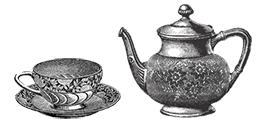Tea Becomes Part of British Culture
 Source: yeomen.org
Source: yeomen.orgQueen Elizabeth I
thirsted for riches, power, and prestige
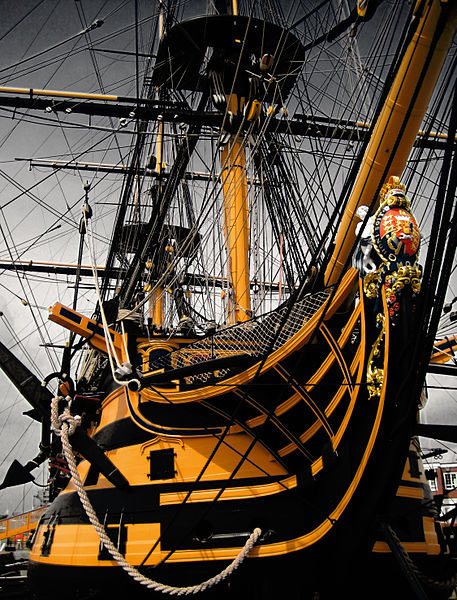 Source: militaryphotos.net
Source: militaryphotos.netThe powerful Royal Navy controlled the seas, making it possible to expand the British Empire
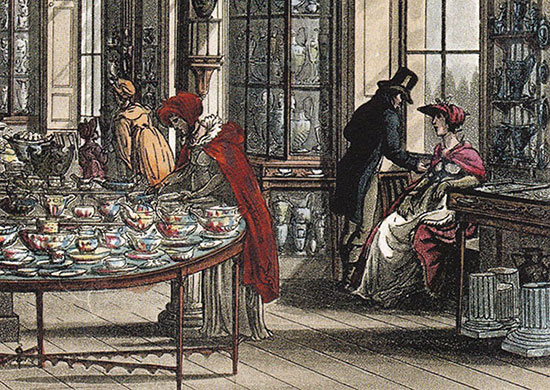 Source: Kim Wilson
Source: Kim WilsonAs with tea, imported, porcelain teaware from China was too expensive for the lower classes
During Queen Elizabeth I's reign, 1558-1603, a desire for world trade and colonialism began and shaped the national purpose of England.
By expanding their reach through trade, Britain could bring home riches and become a maritime power, both of which appealed to the country as a whole. The spirit of exploration became the excuse; plundering, the means; and vast riches, the reward. Become a Tudor queen!
Thus began a cycle of trading for tea to pay for expanding the Empire and expanding the Empire to protect the tea trade. This cycle was accomplished in great part by a private company that was in business for nearly three centuries: the British East India Company.
Maintaining and expanding a large empire was costly and required a strong military. By taxing exotic imports, such as tea, the British Crown was able to pay for the military and for increased expansion.
Buying and drinking tea brought "world trade" into the domestic sphere, and the people of England supported a national purpose that kept the Empire growing and kept them stocked in tea.
Tea was expensive and it became a status symbol. Buying imported, foreign luxury goods in the 18th century was associated with wealth and prestige in the upper classes.
The lower classes of English society could not afford legally imported tea and had to rely on cheaper tea that was smuggled into the country.
Shopkeepers had little knowledge of tea in the early days of its import, but as people became more educated about tea, it raised their standards, and the British became very discerning consumers.
Legal tea purchased from the East India Company was usually pure and unadulterated. If people wanted finer quality and taste, they would have to purchase legal tea. But as time went on, tea imported by the East India Company was only average in quality. Tea from the French and Dutch was middle grade, and tea from Sweden and Denmark was the finest in quality.
Smugglers often sailed to the continent to bring back to England, so there were times that the middle and lower classes of England were drinking better quality tea than the legal tea purchased by the upper classes.
 Source: mellowmint.deviantart.com
Source: mellowmint.deviantart.comTo further trade interests, Elizabeth I had to expand her Empire. Having colonial holdings around the world gave England access to ports, land, and safe passage from which to trade.
The English people supported colonization, believing it to be a source of wealth, prestige, and security.
Tea’s popularity grew, replacing beer and ale, and the English began to see tea as a commodity that could fund the military and fund additional colonial expansion.
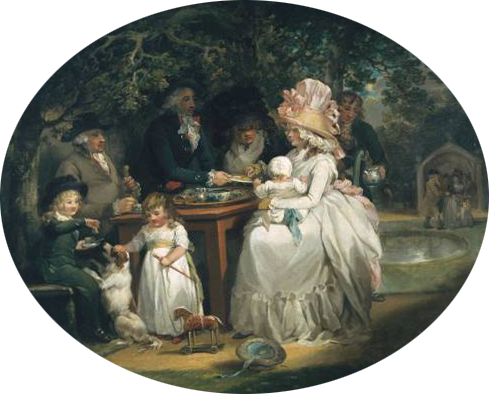 Source: intaglio-fine-art.com
Source: intaglio-fine-art.comThe middle and lower classes could not afford tea, so they purchased smuggled tea. Using smuggled goods had a certain excitement and romantic quality for products they could not otherwise afford.
Britain sold opium to China to pay for tea. They did not believe the Chinese had an addiction problem with opium, since there were more British alcoholics than British opium addicts.
The cultural delineation, between opium and tea, was used to justify the continuation of the opium-tea-silver triangle.
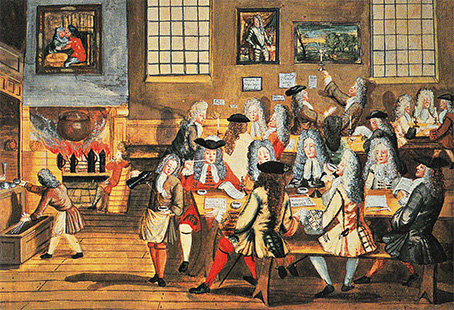 Source: Jane Pettigrew
Source: Jane PettigrewHundreds of coffee houses in London sold coffee, tea, chocolates. Coffee houses changed to tea houses in the 18th century as the English began preferring tea over coffee, and the clientele remained.
Tea houses were popular and filled parts of London. In the famous Exchange Alley, tea houses were places for men to gather, socialize, and discuss events of the day.
Drinking tea was associated with the respectable, civilized, and mild England. Culturally, this was set against the association of opium consumption in China, which the English considered to be barbaric.

Source: libguides.se.edu
At the beginning of the 19th century, the British began to view their success as an international power as a mark of divine power.
To satisfy Britain's high demand for tea, they needed to stop depending on China and start growing tea themselves.
China had an advantage over Britain: after centuries of experience, the Chinese knew how to grow and manufacture tea and the British did not.
Britain needed vast amounts of land and control to apply principles from industrial revolution to grow and manufacture enough tea.

